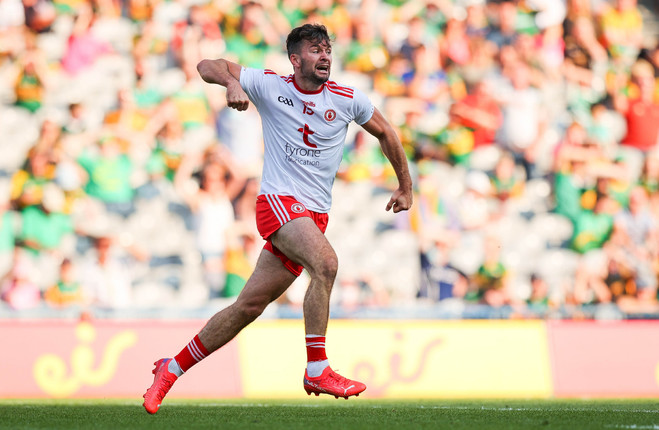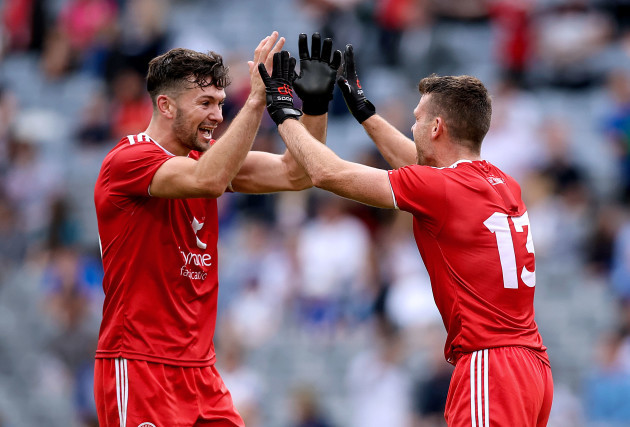HARROW SCHOOL, LOCATED in a borough of greater London, is one of the most prestigious in the world.
Thanks to their historic motto, they would come to play a huge role in the sporting career of Tyrone native Conor McKenna.
Theirs is an attitude of abiding positivity. Every question, any request, must be met with as constructive a response as possible.
Therefore, when the AFL reached out and asked could they convert a portion of their 300 acres into an Aussie Rules field to host a European trial, the school immediately said yes.
A decision was made to arrange a fixture between the AFL academy and prospects from Denmark, England, Germany, Ireland and Sweden on the impressive grounds. Current AFL stars like Christian Petracca and Isaac Heeney played that day.
An 18-year-old McKenna travelled to the UK with his parents for the game. The allure of a professional contract in Australia was obvious. Within an hour, the Eglish St Patrick’s club man would have a choice of several.
He finished with four goals. Administrators who were in attendance still chuckle at the memory of scouts literally surrounding the teenager and his family. Six different clubs expressed interest. Essendon eventually won the battle.
He was skilful and tough and ambitious but none of those qualities could tranquillise the homesickness. McKenna progressed on the field, eventually amassing 79 AFL appearances, while the off-field struggle persisted. Tyrone was always calling.
Various resolutions were sought and tested. Several family members moved to Melbourne at one point or another. Weekly sessions with local Gaelic football side the Wolfe Tones were arranged. McKenna was routinely spotted exploring Flemington, where he could get a fix of his other sporting interest: horse racing.
Publicly, the club were furious when he played for his home club without permission in the county championship. Privately, there was a general understanding that McKenna did things his own way. The only ask was to be kept in the loop in the future.
As much as he and the club tried, that feeling lingered. The void was insatiable.
“Conor was a big homebird,” says Meath native Cian McBride. He has just finished his second year with Essendon and was McKenna’s housemate in Melbourne last year.
“He knew he would go home some day and all the Covid stuff in his final year didn’t help. He had a tough skin too, but you go where you feel like you belong. That stuff doesn’t make you feel welcome.
“Don’t get me wrong, I think he did enjoy his time here. Look, like a lot of us, it is always in the back of your mind. Myself, I know one day I will go home and play with Meath, please God.
“He could have stayed here another seven or eight years; he was that good. But he followed his heart in the end. I admire him for that.”
It was Dan Richardson, then the Essendon general manager of football, who announced McKenna’s retirement. He and welfare manager Matt Little worked closely with the Tyrone man and his family during his stint Down Under.
Richardson is particularly well placed to understand the pride of place at the heart of the Irish recruits. His father, Barry Richardson, was the first to travel to Ireland alongside Ron Barassi and unearth external gems. Barry recruited Sean Wight and Jim Stynes, the pathfinders for GAA players in Aussie Rules.
“When Sean first came, he lived with my late grandmother because his parents wouldn’t let him come to Australia unless he went to mass every week. My grandmother being a Catholic, she promised them she’d ensure he went,” Richardson recalls.
Their policy with McKenna was complex. The club engaged closely with his family and host family. They wanted to do right by the electric half-back and the club. One misstep either direction could tip the scales.
“For me, it is about getting the balance between supporting the individual, which we want to do, and the broader group. It certainly presented challenges for the club. I won’t sit here and say everything was done was right or not.
“You weigh up what is good for the individual and what is good for the broader group. A certain standard you need everyone to buy into.
“People say some of the allowances we made for Conor weren’t right for the broader group, but that is a challenge when you bring a guy in from outside the country. His obvious talent is tied up in it.
“We like players who can still play to their strengths and exhibit individual flair as long as they are in the boundary of team rules and culture. Conor, you could argue, pushed the boundaries. But there was enough great stuff, enough X-factor, that was of huge value.”
McKenna’s issues with the Melbourne media are well publicised. He fell under their spotlight after a false positive coronavirus test. Initially journalists scrambled around his neighbourhood in search of the infection location. Footage of him clearing his nose at training was published and analysed.
“I just felt very sorry for him,” recalls McBride. “The media out here, they pick something and really go to town on it. He wasn’t even positive in the end. I felt like he was hung out to dry.
“We try put stuff up and say how we feel about it, because it’s one of your own.
“I’ve noticed, even with Australian athletes, they get 10% of a story and just fill in the 90%. There was a couple of things last year over hubs and that, blown out of proportion just as much as McKenna was. All they need is a sniff and away they go.”
It was one of several dominos that brought his career to an end. There was a general understanding the club had done right by the player and the player wanted to do right by the club. Talk of following up on a lucrative offer from one out of state team, outside of the footy-obsessed Melbourne bubble, was dismissed.
McKenna’s first game as a fan of Tyrone was the 2005 All-Ireland final. The time had come for him to try and help the county reach the same summit again.
For the club, his retirement came as little surprise.
“From Essendon’s perspective, it was funny,” says Richardson.
“When Conor and a few other players left, lots of people drew a conclusion that all these players wanted to leave, and it was connected. My view on that is they each had their own individual reasons. In Conor’s case, the homesickness was always at the back of his mind, as much as he made a strong fist at AFL.”
Every return home in the off season proved particularly difficult. Once, when McKenna’s return flight was delayed by a day, his father had to convince him to go.
The week before the start of the 2020 season, Essendon granted the 25-year-old permission to return home indefinitely.
“I still couldn’t answer honestly whether that was the right decision. One the one hand you could argue it was, it helped with his homesickness and kept him around for a bit longer but on the other hand, he still ultimately made the decision to go back home.
“Did that help Essendon in the short term and Conor? Probably. Long term? Probably not.”
What are the consequences from Conor McKenna’s chapter in Australia? Largely positive. It enhanced the club’s understanding and influenced how they make decisions around future Irish prospects. McBride was granted permission to return home last month before Essendon’s final against Wester Bulldogs. Not only can he play for his club and county during the offseason, but he is also one of the very few who does not have to sign an insurance waiver to do so.
Scouts still point to McKenna’s exceptionality as the rare quality that can be found through the Irish Experiment.
As much as he achieved, there is no doubt the Irishman had the capability to do more. However, for Richardson, it was by no means a career unfulfilled. His is a skillset primed to shine on any stage.
“I don’t think so. From what I could tell he wasn’t going to fulfil his absolute potential in the headspace he was in. He has huge sporting potential; it doesn’t have to be AFL.
“Whatever his potential is, he is so much more likely to fulfil it by being at home.”
Where he belongs.


